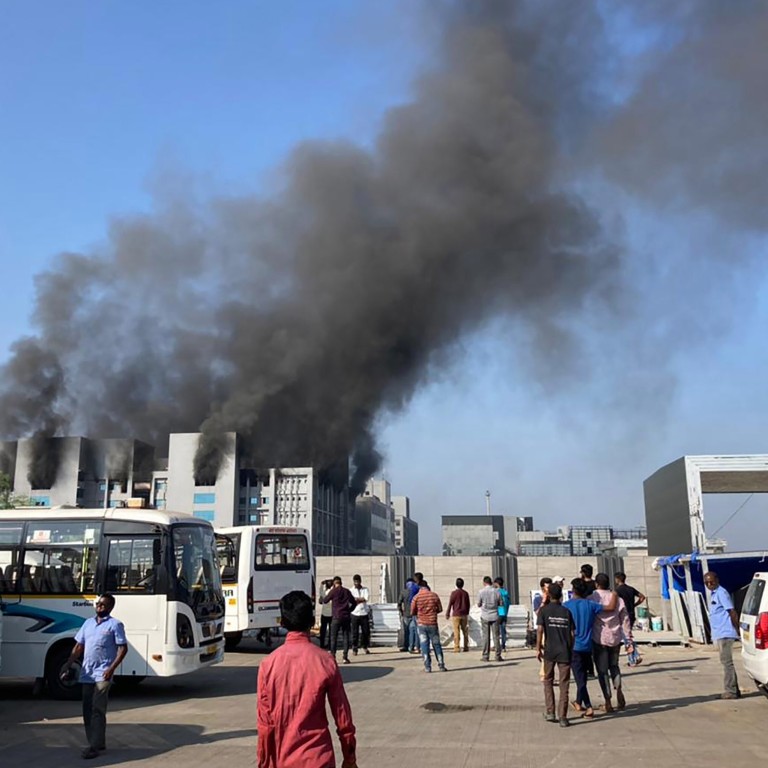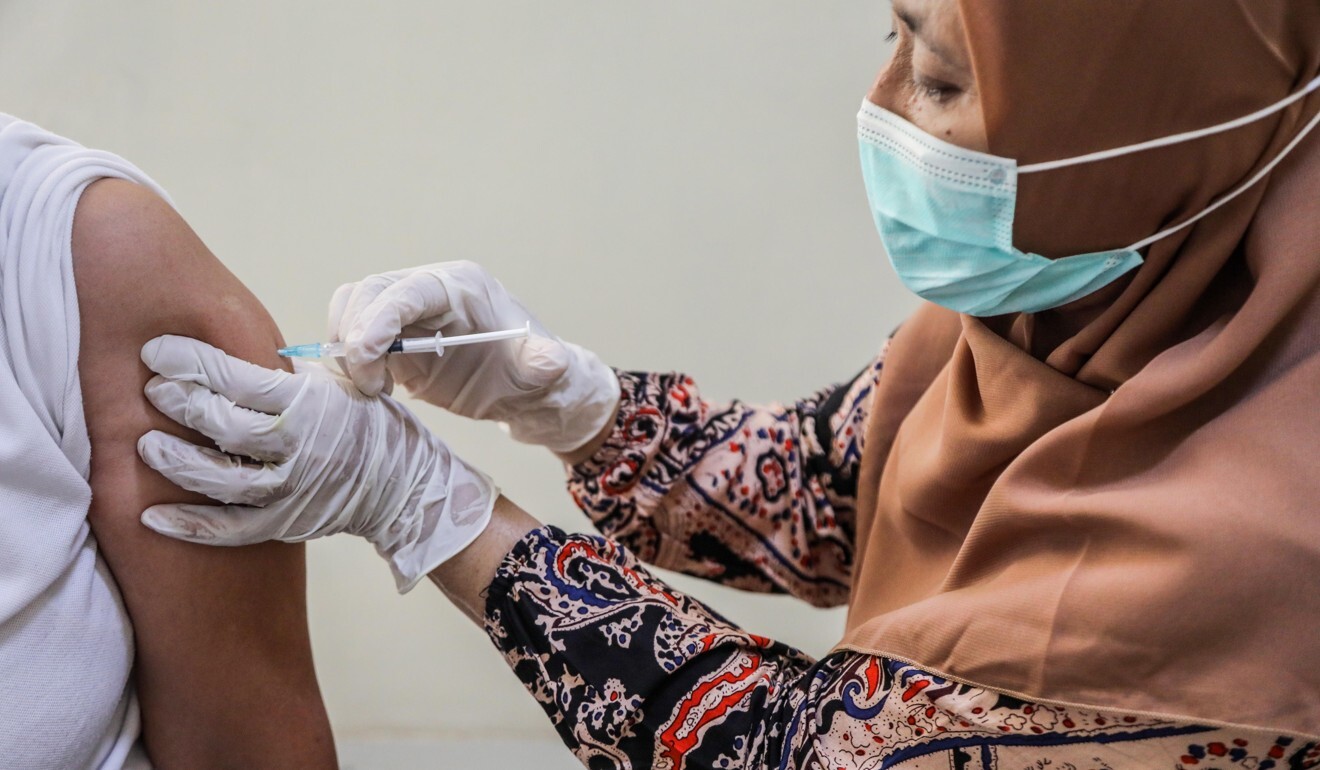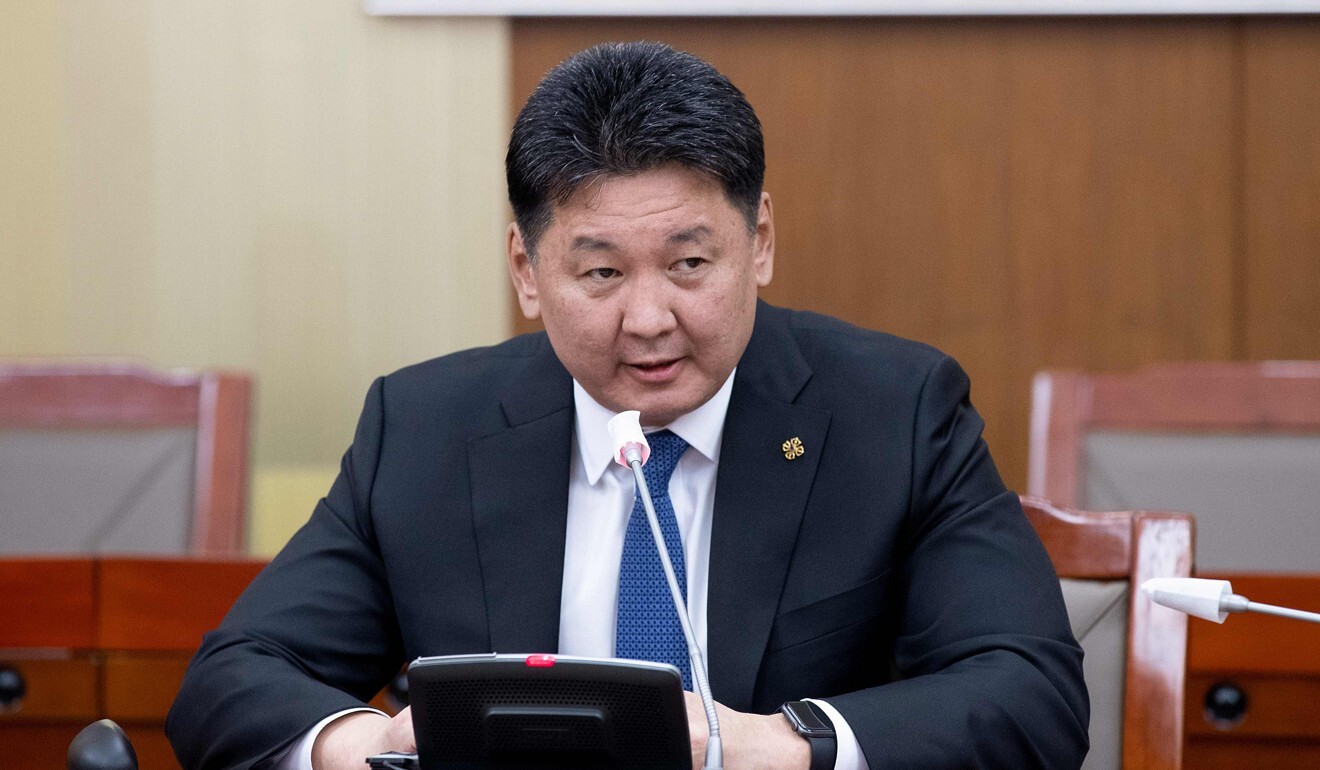
Coronavirus: five dead after fire hits world’s biggest vaccine maker in India; Japan’s Tokyo sees more than 30,000 cases in a month
- The fire at the Serum Institute, which is making millions of dose of coronavirus vaccine, has not affected production
- Elsewhere, Indonesia reported a record 346 deaths on Thursday and Mongolia’s PM resigned over Covid-19 protests
Rescuers discovered five bodies in the under-construction building after the blaze at the Serum Institute of India was brought under control, media reports said, with officials in the western city of Pune confirming the toll.
Television channels showed thick clouds of grey smoke billowing from the sprawling site in Pune, which is responsible for producing millions of doses of the Covishield coronavirus vaccine, developed by AstraZeneca and Oxford University
“It is not going to affect production of the Covid-19 vaccine,” a Serum Institute source said, adding that the blaze was at a new facility being built on the 100-acre (40-hectare) campus.
A fire official told reporters that “three or four people were inside” when the blaze broke out, but all had been rescued.
Many other countries are relying on the Serum Institute to supply them with vaccines.
Tokyo records more than 30,000 cases in a month
Tokyo’s tally of new coronavirus infections for January topped 30,000 on Thursday, with the month already accounting for around a third of the capital’s cumulative total.
The unabated rise in cases has fanned growing concerns that the medical system is on the brink of collapse, with a notable increase in cases of people dying at home.
Under the state of emergency, people have been urged to refrain from going outside unnecessarily and restaurants asked to shorten their opening hours.
Indonesia sees record deaths, mass vaccinations by May
Data from Indonesia’s Covid-19 task force showed that deaths now total 27,203, while confirmed cases reached 951,651, among the highest in Asia.
The record fatalities and sharp rise in daily cases in recent weeks comes amid warnings that the situation could imminently worsen in Indonesia’s hospitals.
“Hospitals could collapse in the coming days if they’re not managed,” said Irma Hidayana, a co-founder of the data initiative group Lapor Covid-19.

Isolation beds at Covid-19 referral hospitals in Jakarta had reached 87 per cent of capacity and intensive care unit beds were 82 per cent occupied, data from the city government showed as of January 17.
Indonesia started its mass vaccination campaign last week and aims to inoculate 181.5 million people, or roughly 67 per cent of the population, to reach herd immunity.
Health minister Budi Gunadi Sadikin said on Thursday that he hoped the country could start vaccinating the general public by May or the end of April.
“[Vaccinations] will happen for 1.4 million health workers between January to February, after that 17 million public workers will be vaccinated, then we will provide vaccines for 25 million seniors,” he said.
Mongolian prime minister resigns after Covid-19 protests
Landlocked Mongolia reported just a handful of Covid-19 cases last year after imposing strict border controls, but in November its first domestic transmissions caused a new wave of lockdowns and restrictions.
Anger mounted this week after television footage showed a woman who appeared to have recently given birth being moved to an infectious disease centre wearing only hospital pyjamas and plastic slippers, despite temperatures dipping to minus 25 degrees Celsius.
After protests outside government buildings on Wednesday, the Mongolian politician apologised on behalf of the government and said he would stand down immediately.

“Unfortunately, we made mistake during relocating that mother,” admitted Prime Minister Khurelsukh Ukhnaa Thursday. “It was heartbreaking to see how she was treated.”
“As a prime minister, I must take the responsibility.”
The video of the woman in an ambulance clutching her baby prompted fierce criticism, particularly as Mongolian tradition dictates new mothers should avoid the cold weather and cold food for the first month after birth.
On Wednesday around 5,000 mostly young protesters gathered in a square opposite government buildings in the capital Ulaanbaatar, some carrying wrapped up bundles to represent babies.
Philippines nears vaccine deal with Moderna
A supply deal with Moderna is likely to be finished this month, said Carlito Galvez, who leads the vaccination programme. The nation is also expecting to receive fewer doses from the World Health Organization-backed Covax Facility, he said.
‘BFF prices’, no corruption: Manila defends deal with China’s Sinovac
Infections outside the Manila capital region are rising. “People went back to the provinces during the holidays and had festivities, so that may have contributed to the increase,” Health Undersecretary Maria Rosario Vergeire said.
The Philippines has the second-highest number of cases in Southeast Asia, with nearly 506,000 as of January 20. Cities on the southern Mindanao island have topped the daily case count in the past days, although the capital region still has the highest total infections.
Sri Lanka reopens to foreign tourists
Full operations also resumed Thursday at the island’s two international airports, accommodating commercial flights.
Under new protocols to prevent the spread of Covid-19, tourists must be tested for the virus in their country 72 hours before their flight, when they arrive at their hotel in Sri Lanka and again seven days later. They must stay in a “travel bubble” designated in 14 tourism zones without mixing with the local population. About 180 hotels have been earmarked for tourist accommodation.
Testing, testing: Sri Lanka cautiously reopens to tourists
The resumption of tourism follows a pilot project that began December 26 in which 1,500 tourists from Ukraine visited Sri Lanka in such a travel bubble.
The government closed the country to tourists last March when an outbreak of the virus surfaced. The international airports were closed except for limited flights enabling Sri Lankans to return home. Tourism is a vital economic sector for Sri Lanka, accounting for about 5 per cent of its gross domestic product and employing 250,000 people directly and up to 3 million indirectly.
Sri Lanka had fewer than 4,000 cases of coronavirus infection until October when clusters centred on a garment factory and fish market spread in the capital, Colombo, and its suburbs. As of Thursday, it has confirmed more than 55,000 cases with 274 fatalities.
Australia to require pre-departure tests
People travelling to Australia from most other countries from Friday will need to test negative for the coronavirus within the three days before they depart, according to orders signed by Australian Health Minister Greg Hunt. All internationals passengers will also need to wear masks on their flights.
“The success at home, the agonising challenges abroad, the fact we have new more virulent strains that are emerging around the world – these remind us of precisely why we have been able to keep Australians safe,” Hunt said. New Zealand and a few Pacific Island countries are exempt from the new rules.
Opinion | Coronavirus has exposed Australia’s quasi-colonial outlook
Meanwhile, Australia recorded a fourth day of zero coronavirus cases on Thursday, prompting the chief of the country’s most populous state to call for a special travel bubble with Pacific island nations.
New South Wales has reined in an outbreak in mid-December that prompted a strict lockdown in Sydney’s Northern Beaches, while broader social distancing rules and mandatory mask wearing were imposed for the rest of the city.
Signalling those restrictions were set to be eased next week, Premier Gladys Berejiklien told local media the federal government should consider establishing a travel arrangement with the Pacific. “There is no reason why we shouldn’t aim to travel to New Zealand or some of the Pacific Islands well within the next 12 months,” Berejiklian said.
Australia has reported more than 22,000 local Covid-19 cases and 909 deaths since the pandemic began.
Reporting by Agence France-Presse, Reuters, Associated Press, Kyodo, Bloomberg
